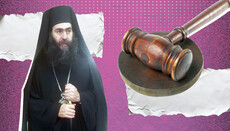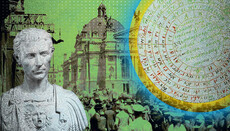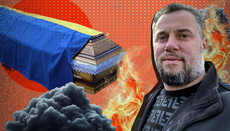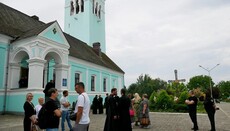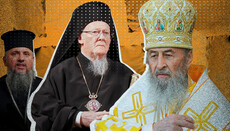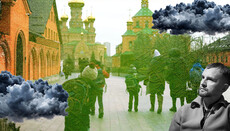Who Sees PR Technologies in Ptycha Events?
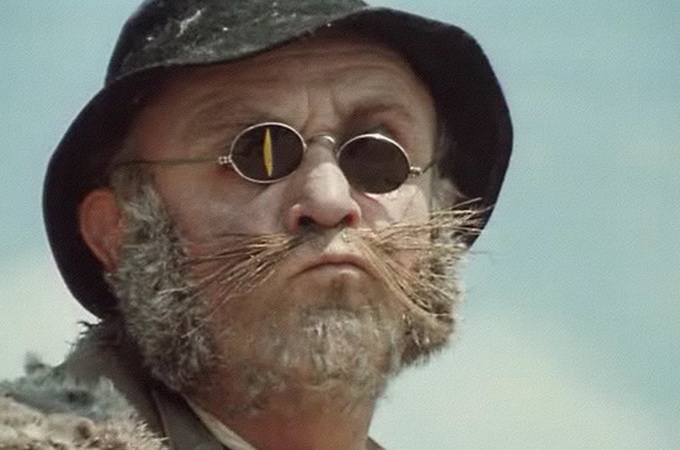
Violent confrontation for the UPC church in the village of Ptycha, Rivne region, set many people on both sides of the conflict in turmoil. Some saw in the fellow villagers "Moskals"(pejorative term for the Russians and pro-Russian people), while others became confessors of faith, showing firmness and courage in defending the Orthodox sanctuary.
One of the materials that highlighted a rather "alternative" view on Ptycha events was an article by the journalist Denis Tarhonsky "Ptycha in the focus of modern PR technologies", which was published on the website "Religion in Ukraine". In the first lines Mr. Tarhonsky calls for sober analysis, however, the matter did not get any further. Moreover, having read the theses presented in this article, the reader may notice that the author is trying to “fight” with the apparent "PR technologies" by means of real information manipulation. So let's try to make out all the inconsistences of information provided, which expose an obvious whitewash in the material.
Factual inconsistences
Denis writes that Bishop Bartholomew in his appeal to the President of Ukraine exaggerated saying that the authorities contribute to the conflict. Here he states that the police behaved politely and even stood bareheaded when the UOC was having a cross procession. And most importantly, Denis refers to "a person close to him, a direct participant of the conflict and a resident of Ptycha village" as a source of information.
First, it seems strange when a journalist who, in his own words, is trying to make a sober analysis of the situation doesn’t present different views of confronting sides, but uses one source of a-little-bird-said information and claims that such a "source base " is able to reflect the real situation, which took place in a problematic parish. Strange, isn’t it?
Now let’s get back to the words that the authorities did not support the conflict (including the police as their representatives). Let's read what Denis himself says about it. He sounds quite contradicting. So let's look at the description of events and analyse their sequence, and an inquisitive reader, following the link to the article, will see that nothing is out of context.
"Thus, the group of parishioners of the Ukrainian Orthodox Church (the Moscow Patriarchate), having a court decision in their favour, went to the church, which for a year has been a subject of dispute and confrontation with fellow villagers, who support its transition to the jurisdiction of the Kiev Patriarchate. The latter didn’t admit the UOC believers to the church but the parishioners managed to enter it and held a divine service. After it part of the congregation refused to leave the church building for fear of being refused admission to it again by their opponents. The present police officers neither offended anybody, nor, what is more important, prevented the Orthodox Christians from scratching one another’s eyes out, watched closely the church doors so that nobody could break in",- says Mr. Tarhonsky in his article.
Well, according to the journalists it goes as follows: the UOC believers, according to the Ukrainian court decision, valid throughout the territory of Ukraine, decided to freely use the religious building, which is in their legitimate property. Instead, the Ukrainian police, who, according to the author, don’t respect the decision of the Ukrainian court, stood in their way, not allowing the believers in. There is a rule-of-law state. There is a document that establishes ownership, but the law enforcement body doesn’t protect ownership so that "the Orthodox Christians do not scratch one another’s eyes out." Does it mean that our police are not powerful enough to defend the rights of the legal owners? Or maybe there is another reason for that, and it is exactly what Bishop Bartholomew said in his appeal to the President?
The next factual contradiction of Denis’s statements lies in the following thesis: "Present archpriests should remember what real persecution is and what its price is, but they are not ashamed to call a street brawl "persecution". I wonder when the woman who suffers from a rare genetic disease, could almost lose her life because of the conflict, does this fit in the format of a plain street fight? "We had our toes stepped on, and we call ourselves martyrs", - Mr. Tarhonsky continues his metaphoric passage.
Here arises another interesting detail: according to Denis, some hypothetical "we" serves the subject on the part of the UOC. That “we” are "not worthy to bear this cross." In this case, I want to ask: who is "we"? It would be incorrect to move to the individual in this article, however, the hypothetical "we" requires detailed analysis.
I would like to ask if Denis considers himself worthy to join those "we" - people who suffered for their faith. What's more, not surviving a hundredth of their pain, the journalist speaks from a position of executioner, who calls those believers unworthy, equating their sufferings to a sore corn?
If to talk about unworthiness, in this context it is unworthiness of a "judge" who, having not bothered himself to visit the scene of the conflict, believes he has the right to join those "we" to further diminish their sufferings. Although, in this case triggered a proven manipulative tool. Writing from the first person, Denis appears to know the situation from the inside, though his judgment is based on what "one woman said," or "a friend, a direct participant of the conflict and a resident of Ptycha village." However, we’ll focus on the emotional and ideological discrepancies with the reality further on, but now let's continue to consider factual inconsistences in the article by Mr. Tarhonsky on Ptycha case.
Denis claims that he talked on the phone with the women who were inside the religious building, and they said as if they were free to go out. An interesting situation ... Can we speak about the "split source"? At the beginning of the article there was one person-informant mentioned, and now we see that Denis managed to call almost all the affected. It sounds contradictory, isn’t not it? When the author quotes Patriarch Kirill as for Ptycha village, he blames the hierarch for not even asking the names of people who were in the church. A similar question I want to address Mr. Tarhonsky. Why doesn’t he inform his readers who of the blocked parishioners he talked to by phone? Otherwise, such talks seem doubtful.
Interesting is the following thesis by Mr. Tarhonsky: "But if pastors are not able to fulfill their direct duties and teach people to act like human beings, how can the authorities do that? They do only what they are empowered to - trying to ensure peace and order".
It turns out that if someone maliciously and without any grounds claims your property, the only way for the authorities is to allow alternate use not to offend the raider?
I wonder whether Denis’s logic can be applied to other offenses. For example, the killer wants to deprive someone of life - let him cripple the victim to find a "compromise." The thief wants to steal a wallet and a watch from you, can he rob you of one thing as a "compromise? It’s a paradox, isn’t it? On the example of other offences we see the absurdity of this approach, however, when it comes to the issue of church raid, even such an absurd and discriminatory approach seems appropriate for criminals and those who justify them.
Ideological inconsistences
Having reviewed a number of factual inconsistences in the article by Denis Tarhonsky, we’d like to move to purely ideological aspects. As it has been seen from the above quotations, the author disapproves of the people who simply defended the premises of their church. In addition, he does not find their sufferings to be persecution and equates them with a sore corn stepped on. And now, let us remind you of Dennis’s call for a sober analysis at the beginning of the article. So let's try to soberly analyze the author’s attitude to the other side of the conflict.
"I do not doubt the sincerity of the motives that drove the defenders of the church and ordinary priests, in turn having served at the walls of the church; while some of the villagers mocked and sneered at them throwing shovels of earth into their faces", - Denis describes the behaviour of the UOC-KP representatives in relation to the UOC believers. At the end of that article we see the following: “We can’t judge emotionally-charged people”. That's how the author, who throughout his material blamed the UOC believers, tolerantly comments on the actions of the Kiev Patriarchate followers, who threw shovels of earth at the UOC parishioners during their prayer.
One can talk a lot on the manipulative aspects of the article under analysis, for actually all in it is "beautiful". But we want to address the author with his own words: “Once being the hostages of our own ignorance, we do not accept humbly martyrdom”. We address this thesis to Denis and call on him to visit one of such “hot” parishes next time to humbly accept martyrdom which he so pathetically call us for. Then the source of information will probably be much more valid than "a close person, a direct participant of the conflict and a resident of Ptycha village" and real sufferings won’t feel like “a sore corn stepped on”.
